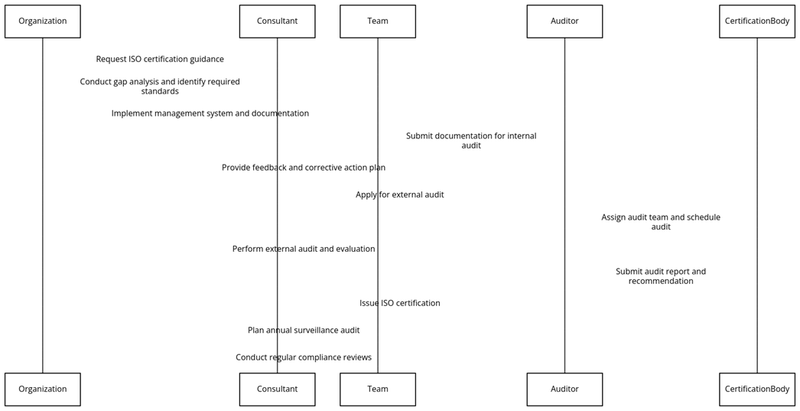ISO Certifications in Barbados - Popular Standards, Requirements and Benefits

Introduction
Barbados has an open, services-led economy built on tourism and hospitality, offshore and domestic financial services, rum distilleries and beverage processing, food manufacturing, construction and real estate, ICT and shared services. As lenders, tour operators, cruise lines and corporate clients sharpen their scorecards, ISO certification in Barbados is moving from a nice-to-have to a routine condition for long-term contracts, franchise agreements and export approvals.
For ISO certification for tourism companies in Barbados, resorts, boutique hotels and villas rely on ISO 9001 for quality and ISO 22000 for food safety so that quality management system hotels Barbados can stand up in tour-operator checks and guest audits. Rum producers and food manufacturers use ISO 9001 food processing certification in Barbados and ISO 22000 beverage industry in Barbados to keep bottling, blending and packaging under control. On the services side, ISO 27001 certification for banks in Barbados, ISO certification for financial services in Barbados and ISO 22301 business continuity in Barbados help banks, trusts and offshore platforms answer deeper questions on cyber risk, uptime and data handling.
Organizations that want to get ISO certified in Barbados often look for affordable ISO certification in Barbados with clear scoping, realistic audit-time and practical guidance. Pacific Certifications does not act as a consultant but as an independent certification body. Share your scope, sites and target standards with our team and we will map an audit plan for ISO 9001 certification in Bridgetown and other locations that matches your seasons, occupancy curves and project timelines.
Economic context and industry overview
Barbados is expected to keep relying on tourism, offshore finance and rum exports while expanding digital, professional and creative services. Visitor arrivals, cruise calls and airline capacity are projected to stay on a gradual upward path, supporting hotels, guest houses, tour operators and food and beverage chains that depend on reliable service levels and food safety.
Financial services and offshore banking remain important, with more clients asking about information security certification in Barbados and ISO 27001 for offshore banking in Barbados when they choose where to book funds and services. Manufacturing, including rum and other beverages, packaged foods and pharmaceutical products, is under increased scrutiny from supermarket chains, brand owners and regulators, pushing demand for ISO certification manufacturing companies in Barbados and ISO certification pharmaceutical companies in Barbados. Across sectors, buyers want documented systems, not just strong brand names.
Why ISO certifications matter in Barbados?
Travel platforms, cruise lines, tour operators, airline partners, banks and institutional investors all want evidence that service, safety and data-handling are controlled through repeatable systems. ISO certification in Barbados helps teams clear vendor-onboarding faster, keep operations steady during high season and reduce incidents that trigger refunds, fines or negative reviews.
For the ISO certification for hospitality industry in Barbados, ISO 9001 for hotels resorts in Barbados supports booking, check-in, housekeeping, maintenance and guest-feedback processes. ISO 22000 for food safety certification in Barbados supports menu planning, kitchen flows, temperature control and allergen handling so that one food incident does not derail an entire brand.
For banks, trust companies and other financial players, ISO 27001 certification for banks in Barbados and ISO 22301 business continuity in Barbados show that information security, backup, recovery and continuity are not left to chance. For rum distilleries, food plants and manufacturing, ISO certification manufacturing companies in Barbados and quality management system manufacturing in Barbados help keep yields, changeovers and product quality under control in a way that auditors can test.
Popular ISO standards in Barbados
These top ISO standards in Barbados businesses give a shared structure to show that tourism, finance and manufacturing risk are handled in a disciplined way.
Certification process in Barbados
Preparation for ISO certification in Barbados should start from how work runs today in hotels and kitchens, distilleries and plants, offices and branches, call-centers and data rooms. The goal is to build an ISO system that fits daily routines so that evidence is easy to show during audits.
List products, services, sites, headcount and high-risk processes so your scope and audit-time are realistic for single-site or multi-site programs.
Map processes end-to-end so handoffs, records and responsibilities are visible from suppliers through to guests, customers, regulators and partners.
Set policy and measurable objectives tied to guest satisfaction, complaint levels, safety, food safety, cyber incidents, energy use and continuity.
Build or refine controlled procedures and work instructions so they match what teams actually do in reception, housekeeping, kitchens, plants, branches and IT.
Assemble evidence packs for key areas such as reservations, front office, food production, housekeeping, maintenance, HR, IT, security and vendor management.
Run internal audits that sample busy periods, peak seasons and high-risk tasks and follow through with corrective actions until issues stay fixed.
Hold management review with KPIs, audit results, incidents or complaints, legal changes, resource needs and agreed actions with owners and deadlines.
Agree your ISO certification consulting in Barbados support, if any, and schedule Stage 1 for readiness checks and Stage 2 for implementation verification with a mix of on-site and remote methods where suitable.
Keep permits, licenses, inspection reports, monitoring data, supplier contracts and key records organized so auditors can test compliance without delay.
What are the requirements of ISO certifications in Barbados?
Implementation should mirror work in hotel floors and kitchens, bars and distilleries, food lines and warehouses, branches and offices, call centers and server rooms so that records make sense to staff and auditors. Below are the key requirements:

Scope aligned to products or services, processes and sites, including multi-site programs and franchise operations where brand standards must be consistent.
Controlled documents and records that match practice, with clear version-control, access rules and change-history that staff can follow without confusion.
Risk assessment with operational controls for real hazards and issues such as food safety, slips and falls, fire safety, chemical use, process contamination, cyber threats, data privacy, energy use and change-management.
Competence matrices and training records for chefs, bar staff, room attendants, maintenance technicians, distillery operators, line workers, tellers, call-center agents, IT staff and supervisors.
Standard-specific evidence such as HACCP plans and CCP logs for ISO 22000, Statement of Applicability and risk files for ISO/IEC 27001, business-impact analysis and continuity plans for ISO 22301 and aspect–impact registers for ISO 14001.
A legal and other requirements register with permits, health inspections, fire and safety checks, alcohol and food rules, financial and data regulations and tourism or hospitality rules that apply to your scope.
Internal audits and management reviews carried out on schedule with nonconformities, corrective actions and decisions tracked until completion.
Tip: Align your controls with tourism, food safety, health and safety and financial rules in Barbados, along with brand requirements from tour operators, cruise lines, airline partners and correspondent banks.
Contact us at [email protected] to get your business certified in Barbados!
What are the benefits of ISO certifications in Barbados?
ISO certification in Barbados should be used as a strategic tool to move faster through supplier tenders and partner reviews, reassure lenders and franchise owners and keep operations steady across high and low seasons. Below are the key benefits:
Faster approval in tour-operator, airline, cruise and online travel platforms for hotels, resorts, attractions and tourism companies.
Fewer incidents, defects and service failures in rooms, kitchens, plants, branches and contact centers, which reduces refunds, claims and lost business.
Clear roles, responsibilities and skill paths for staff from front desk and housekeeping to production, logistics, banking operations and IT.
Traceable data for guest complaints, food incidents, product recalls, transaction disputes, security events and ESG-style summaries for investors.
Stronger supplier and contractor control across catering suppliers, laundry, transport, maintenance, cleaning, IT vendors and security services.
Measured gains in energy use, waste, water consumption, uptime and yields in hotels, plants, distilleries, warehouses and offices.
Better signals of reliability, food safety, cyber control and continuity for international buyers and partners who compare certified and non-certified vendors.
Steady tourism growth, more flights and cruise calls and renewed hotel investment are expected to keep ISO certification for hospitality industry in Barbados in demand, especially ISO 9001 for hotels resorts in Barbados and ISO 22000 for food safety certification in Barbados. Cruise lines and tour operators increasingly ask for structured quality and safety systems when contracting shore excursions, transport and hotels.
Offshore banking, trusts and other financial services are facing sharper questions on information security and continuity, which is pushing demand for ISO certification for financial services in Barbados, ISO 27001 certification for banks in Barbados and ISO 22301 business continuity in Barbados. In manufacturing and rum, brand owners and importers expect ISO 9001 food processing certification in Barbados and ISO certification rum distilleries in Barbados to be in place before contracts are renewed. Affordable ISO certification in Barbados, especially for small and mid-sized providers, is becoming a key topic in buyer and supplier discussions.
Challenges faced in Barbados
Local conditions and sector pressures can slow ISO implementation if teams are not supported. Common challenges include:
Budgeting time and funds for ISO work while managing high-season workloads, staff turnover and renovation or upgrade projects.
Treating ISO as extra paperwork in some departments instead of using it to tidy up reservations, service, production and back-office work.
Shortage of trained internal auditors and process owners who can connect clauses to real risks in tourism, finance and manufacturing.
Gaps in document control, internal audits, corrective-action discipline and record keeping across multi-site hotel groups or branch networks.
Complex supplier chains and franchise structures that make it harder to keep controls consistent across locations and outsourced services.
What is the cost of certifications in Barbados?
ISO certification cost in Barbados depends on headcount and risk-level, the number and spread of sites, your standards set, whether the program is single-standard or integrated such as ISO 9001 and ISO 22000 for tourism, ISO 9001 and ISO 14001 for manufacturing or ISO 27001 and ISO 22301 for financial services, sampling depth for hotels, branches, plants, warehouses or back-office centers and the mix between on-site and remote audit work.
For many small to medium enterprises in Barbados, including guest houses, small hotel groups, food plants and local service providers, ISO certification cost in Barbados is driven more by employee numbers, process complexity and single-site versus multi-site scope than by revenue. Organizations seeking affordable ISO certification in Barbados with competitive pricing should look beyond cost and check accreditation, experience in tourism or finance and clear audit-time explanations.
Pacific Certifications provides a documented proposal that itemizes Stage 1, Stage 2 and surveillance days, explains on-site versus remote activities and highlights any multi-site efficiencies so leadership and finance teams can plan clearly. For a tailored ISO certification cost in Barbados for your hotels, tourism businesses, financial services or manufacturing operations, contact [email protected] and request a cost estimate and draft audit timeline.
What is the timeline for certification in Barbados?
Timelines depend on document and record readiness, the speed of closingStage 1findings, single versus multi-site scope and whether the program is single-standard or integrated. Planning around high and low seasons, renovation works, financial year-end and key partner audits also shapes the calendar.
A prepared single site, such as one hotel, plant, rum distillery, office or data room, can often move from application to decision within one audit cycle if documents, records and internal audits are in good order. Multi-site or integrated programs, such as a hotel chain with several properties or a financial group with branches and back-office centers, need more sampling and planning time, especially where operations differ between locations.
Important standards often requested by buyers in Barbados
These are among the top ISO standards in Barbados businesses when buyers, lenders and brand-owners set conditions for contracts and partnerships.
How Pacific Certifications can help?
Pacific Certifications, accredited by ABIS, audits and certifies ISO management systems for tourism and hospitality, restaurants and catering, rum distilleries and food processing, manufacturing and pharmaceutical operations, banks and financial services, offshore banking platforms, ICT, shared services and public or utility organizations across Barbados. We work as an independent, third-party certification body with accredited auditors and transparent pricing, not as professional ISO certification consultants in Barbados, so our role is to assess and certify rather than to write your system.
We build audit plans that fit hotel seasons, production schedules and financial closing cycles so that ISO certification manufacturing companies in Barbados, ISO certification for tourism companies in Barbados and ISO 27001 certification for banks in Barbados can be completed with minimal disruption. To get ISO certified in Barbados with a clear Stage 1 and Stage 2 plan, contact [email protected] and request your ISO audit plan and fee estimate.
Accredited training programs
Pacific Certifications provides accredited training programs for organizations in Barbados that want to strengthen internal capability instead of relying only on external consultants:
Lead auditor training: For professionals who audit ISO 9001, ISO 14001, ISO 45001, ISO 22000, ISO/IEC 27001 or ISO 22301 in hotels, plants, financial institutions and service organizations.
Lead implementer training: For personnel who design and improve management systems in hospitality, food processing, rum distilleries, manufacturing, banks, IT and shared-service centers.
These programs run online or on-site, depending on client needs, and are delivered under ISO/IEC 17024 for personnel certification.
Contact Us
If you need support with ISO certification in Barbados, contact us at [email protected].
Read More at: Blogs by Pacific Certifications

